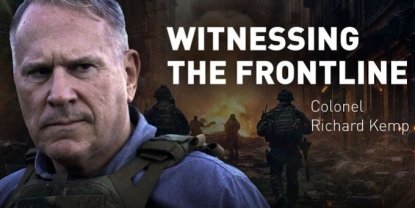Colonel Richard Kemp, a retired British army officer, visited the front line of the Ukrainian counteroffensive together with the online.ua team and told what the Ukrainian military had to face.
Source: YouTube channel online.ua
Colonel Kemp visited the front line in Ukraine
Today, I saw with my own eyes the Ukrainian counteroffensive, which has been going on for four months. And I witnessed how difficult this struggle is for both Ukrainians and Russians.
Kemp emphasizes that the Ukrainians are trying to break through the highly protected Russian defensive positions. This is a challenging task, especially without air superiority, and indeed with Russian air superiority.
I saw with my own eyes the maneuvers of the highly qualified Ukrainian military in counterattacking and repelling local Russian attacks.
Another thing that struck Colonel Kemp, apart from the courage of each Ukrainian soldier and their position commanders, is the benefit and results they are achieving in this battle using reconnaissance drones.
These things are a combat multiplier. They [drones] allow the Ukrainians to identify Russian military movements and deploy their forces, either artillery or mortars, to neutralize the Russians when they try to surround Ukrainian forces.
The use of these drones is awe-inspiring and highly effective.
Such things will not win a war and a counterattack. Colonel Kemp believes that Ukraine needs much more than just drones. She needs more tanks. She needs planes. She needs more artillery.
They [the Armed Forces] need all of that, and I think we should give them all of that. The struggle that Ukraine is waging is not only a struggle for Ukraine, it is also a struggle for the Western world. Because if it ends with a ceasefire, then Russia will take over the territories it has already captured in the East and South of Ukraine. This will mean the victory of Russia, the victory of Russian aggression. This will mean defeat for Ukraine and defeat for NATO. And I don't think we should count on that, because a ceasefire is not going to end it all.
President Putin, and perhaps even his successor, whoever he becomes, will not just leave Ukraine alone.
They [the Russians] will "lick their wounds", rebuild their military forces and attack again. And they can attack not only Ukraine again. They can attack other European countries, which, in their opinion, are also illegitimate and should be under the power and control of Russia.
So, according to Kemp, this is a fundamental problem. And this is a fundamentally important victory that Ukraine must win.
But she will not be able to do it alone. Ukraine must have the support of its Western partners to enable these extremely brave and skilled Ukrainian soldiers, whom I saw on the battlefield against the Russians, to win over Russia.
What is known about Colonel Richard Kemp
Colonel Kemp has an Order of the British Empire, served as an infantry officer in the British Army in conflicts in Northern Ireland, Iraq, Afghanistan and the Balkans, and commanded British forces in Afghanistan.
He is a writer, journalist, media commentator and Ambassador of the non-profit program "Payback4Ukraine", which provides justice for Ukraine: it uses strategic legal processes to compensate ordinary Ukrainians.
He provides strategic advice on leadership, security, intelligence, counter-terrorism and defence.
He is a regular columnist for the Daily Telegraph and other UK national newspapers and a commentator on defence, security, intelligence, terrorism, Middle East politics and Israel-related issues in the UK and international media.
Colonel Kemp visited Kyiv twice and was at the front to support the Ukrainian military.

